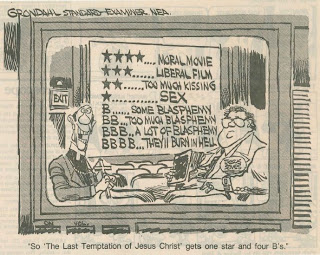 |
| The Cal Grondahl cartoon that ran alongside the editorial. |
Book-burners and self-appointed censors are fanning the fires of fear and ignorance again. This time they're out to get "The Last Temptation of Christ," a new movie that supposedly takes an unorthodox view of the life of Jesus Christ.
Based on the 1955 novel by Greek author Nikos Kazantzakis, the film -- which has not been made available for preview in Utah, where currently there aren’t plans for its release -- reportedly takes a fictional "what if?" view of Christ's life, portraying him as a human being subject to temptation, lust and anger. The movie opens today in select cities in the United States and Canada.
The would-be censors -- mostly Christian fundamentalists who haven't seen the film -- have denounced it as blasphemous, a sacrilege and anti-Christian. They've based most of the attacks on 10-year-old versions of the film script, which according to Universal Pictures, the studio releasing the film, was extensively rewritten.
The Rev. R.L. Hymers, a Los Angeles evangelist, offered Universal $10 million for the original negative and all existing prints of the film so he could burn them. Universal turned him down, citing First Amendment rights. Hymers and his ilk apparently assume they know what's best for the American public.
Traditional American thought holds that the people of this country be allowed to decide for themselves. We call it a democracy, where artists -- in this case, film director Martin Scorsese ("Raging Bull") -- have a right to free expression, and citizens have a right to patronize the arts.
The error made by protesters is that by coming out so loudly against the film, and speaking from a confessed position of ignorance about the subject of their wrath, they betray the cause. Their enraged outcry will make people more aware of the film, prompting them to see it out of curiosity. If, indeed, the film is as offensive as the groups contend, word of mouth will kill it at the box office. Americans will not spend good money to view something they don't like.
Movie theaters are not like television sets, every American household doesn't have one. Attending a screening at a local theater involves forethought and the expenditure of effort and money. "The Last Temptation of Christ" -- great or loathsome as it may be -- will not be seen by anyone who does not want to see it. This simple truth is lost on the pious folk who launched a preemptive strike against "The Last Temptation of Christ." They have displayed a lack of faith in their fellow citizens, and a disregard for the right of individual choice.
Furthermore, their attempts to bully Universal Pictures into shelving the film have become increasingly desperate. In addition to a planned boycott of MCA, the corporation that owns Universal, by the Tupelo, Miss.-based American Family Association, more than one fundamentalist organization has raised the specter of anti-Semitism.
When Hymers picketed outside the home of MCA chairman Lew Wasserman, who is Jewish, the picketers carried signs printed with "Wasserman Fans Jew Hatred." That Wasserman, in all likelihood, had nothing to do with the decision to make the film, was ignored. In fact, Kazantzakis was Greek Orthodox, Scorsese is a Catholic and the film was written for the screen by Paul Schrader, a Calvinist. Claiming that release of the film will spur an anti-Semitic backlash has no relevance to the issue and can only be viewed as a racist attack.
After the movie has been released in this area -- and only then -- we will be able to debate its merits. Until we see the movie this portion of the discussion is moot. For now, the dialogue should center on the right of local theaters to exhibit the film and of the citizenry to view it.
The call for censorship has reached the Ogden area, too. Petitions are currently circulating, gathering signatures in an attempt to convince local theaters not to play the film. While petitions are a wonderful tool of our pluralistic society, it makes no sense to prejudge a film you haven't seen. America has a rich tradition of religious freedom. But we also look proudly on our freedom of speech -- or, specifically in this case, as the freedom of speech applies to artistic expression. The zealots who are so fervently attempting to make our decisions for us -- and, by extension, denying our right to decide -- should take another look at the First Amendment to the Constitution of the United States:
"Congress shall make no law respecting an establishment of religion, or prohibiting the free exercise thereof; or abridging the freedom of speech, or of the press; or the right of the people peaceably to assemble, and to petition the Government for a redress of grievances."
The decision should be ours, and not left up to the counterfeit power of a vocal pressure group.
-- D.P.
vwuxhhif0l2
ReplyDeletegolden goose outlet
golden goose outlet
golden goose outlet
golden goose outlet
golden goose outlet
golden goose outlet
golden goose outlet
golden goose outlet
golden goose outlet
golden goose outlet